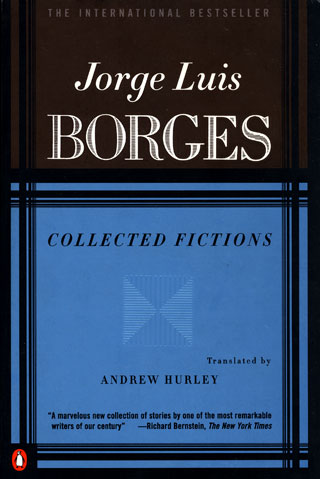 I cannot find the direct quote, but Haruki Murakami’s translator said something to the effect that you should never learn a second language, because it will make you realise how much your favorite foreign-language books were corrupted in the translation. I don’t think this would be much of an issue with Borges’ writing. There’s a timelessness about his stories, as if they’re not constructed from fragments and morphemes but from ideas. So long as a language recognizes the basic building blocks of logic, Borges’ tales can be translated to and read it in.
I cannot find the direct quote, but Haruki Murakami’s translator said something to the effect that you should never learn a second language, because it will make you realise how much your favorite foreign-language books were corrupted in the translation. I don’t think this would be much of an issue with Borges’ writing. There’s a timelessness about his stories, as if they’re not constructed from fragments and morphemes but from ideas. So long as a language recognizes the basic building blocks of logic, Borges’ tales can be translated to and read it in.
This book collects most or all of Borges’ “fiction”. This makes for a varied read, but varied is the rubric of everything Borges’ wrote. This collection is everything at once, all the time. Alternate history runs into proto-Ballardian speculative fiction, which bows out for poetry and fantasy and essays. Erase the front and back cover and this could be an anthology by at least five separate authors.
The first section is A Universal History of Infamy – tales of swashbuckling and adventure that blend history and mythology in the same way as…actual history. These stories are thematically shallow but action-packed and exciting. Borges apparently didn’t think much of this book, but what did he know?
Then we get to the the two legendary collections – Ficciones and The Aleph. What can I say about them? Try to understand them and you will only get part of the truth. Try to describe them and they will sound distorted and ruined on your tongue. Try to imitate them and you will fail. This is partly because of Borges inimitable style – direct, yet coy – but it’s mostly because these stories are about things truly beyond human comprehension. The human figures in his stories seem dwarfed, like ants gathering food in the shade of the Colossus. Even the stories that don’t invoke mathematical infinity have a larger-than-life quality about them, such as the haunting “Tlön, Uqbar, Orbis Tertius”, which evokes similar feelings of cosmic dislocation as Mark Danielewski’s House of Leaves, and more gracefully too.
The tales from The Maker are slightly less ambitious but are entertaining and thought provoking. There’s “Borges and I”, probably the only story I’ve read that’s in the both the first and second person simultaneously, and “Toenails”, a disturbing musing on one’s body parts. It’s the sort of thing that might have appeared on Jorge Luis Borges’ blog, had such a thing been possible.
There were better writers of philosophy (numberless), better writers of fantasy (a lot), better writers of horror (a few), and better writers of speculation fiction (one or two), but nobody else was a jack of this many trades. He was even a master of pithy quotes (“a fight between two bald men over a comb” – on the Falklands conflict). Almost everything in this collection is entertaining, and everything is the operational word here. Other writers are like tiles in a floor. Borges is the cement poured between the tiles – connecting everything, joining all. Now come, membership at the Library of Babel awaits.
No Comments »
Comments are moderated and may take up to 24 hours to appear.
No comments yet.
